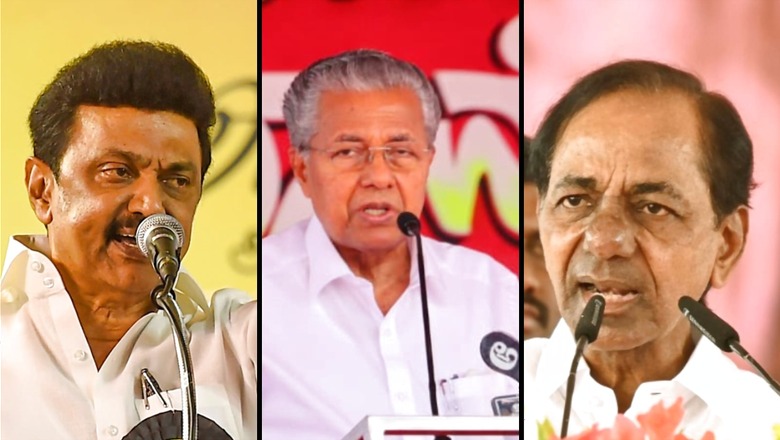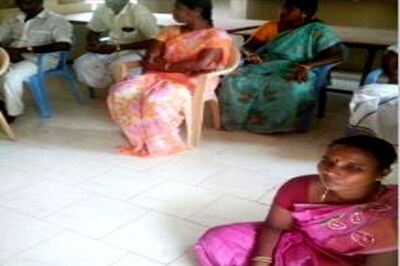
views
Taking a leaf out of his West Bengal counterpart Mamata Banerjee’s book, Kerala Chief Minister Pinarayi Vijayan has issued orders to remove Governor Arif Mohammad Khan from the post of Chancellor of Kerala Kalamandalam, a deemed-to-be-university for art and culture.
The move by Vijayan — four months after Mamata Banerjee replaced West Bengal Governor Jagdeep Dhankar as chancellor of some state-run universities — comes amid sharp escalation of tensions between Khan and the LDF government in Kerala.
A similar confrontation is on the boil between the government and governors in two other southern states – Tamil Nadu and Telangana, the latest in a string of such confrontations in non-BJP-ruled states.
While the governors of these states have been accused of being the “mouthpiece of the central BJP”, the public spats have also begun affecting administration. As the rift intensifies, Chief Ministers of Kerala, Tamil Nadu and Telangana have been accusing their respective governors of being “anti-democratic” and “anti-constitutional”.
Former Kerala University Pro Vice-Chancellor Dr J Prabhash weighs in, saying the stand taken by the Governors is turning out to be “disruptive politics”. Those occupying the post are going beyond their role as mandated in the Constitution and meddling with local politics, he observes.
“The Governors are getting involved politically and what the BJP as a political party is unable to do in these non-BJP ruled states, they want their governors to do for them,” he alleges.
In the three southern states, the government and Governors have locked horns over appointments of Vice-Chancellors to universities, bills pending with the Raj Bhavans and the alleged lack of respect shown to the constitutional post of the Governor. But Prabhash acknowledges that some of the issues the Governors have been highlighting, like corruption and maladministration, are real issues.
“Many appointments in universities were of people close to those in power. Maladministration in Kerala universities is a reality and the Left Front government could have addressed these issues first and then confronted the Governor. They would have been on a moral high ground,” he says.
In Kerala, the stand-off started soon after Arif Mohammad Khan was appointed to the office in 2019. He initially alleged that the state was indifferent to him and did not take action when he was heckled by delegates at the Indian History Congress in Kannur University. Khan later objected to the extension of tenure of the Kannur University V-C Gopinath Ravindran, alleging that he had been involved in several illegal appointments and also referred to him as a “criminal”.
But the face-off intensified when the Governor refused to sign the controversial Lokayukta Amendment Bill. Khan took the unprecedented step of addressing a press conference to level serious charges against Pinarayi Vijayan, his office staff, the CPM and state police officials.
Vijayan countered the Governor’s allegations by calling him a “tool of the RSS” who has been “misusing his office”. Khan had recently refused to address a press conference in Chennai until two media houses, Kairali and Media One, whom he called “mouthpieces of the government”, left the venue.
In neighbouring Tamil Nadu, the ruling DMK and its allies wrote to President Droupadi Murmu demanding the recall of Tamil Nadu Governor RN Ravi, saying he was “unfit to hold the constitutional office”. A memorandum was signed and sent to the Rashtrapati Bhavan after the cohort failed to get an appointment with Murmu.
The memorandum also listed 20 bills that have been pending with Governor Ravi, awaiting his assent. In April this year, DMK leaders protested in the Assembly stating that despite the NEET Exemption Bill being passed twice in the state Assembly, Governor Ravi did not send it to the President for assent.
“It is the same age-old tactic that the Congress used to do of using the Governor to destabilise state governments. Now it is being taken up one notch higher with public squabbles as we see in the case of Dhankhar or Bhagat Singh Koshyari, Arif Mohammad Khan or RN Ravi. It is the same model,” says political analyst Sumanth C Raman.
Apart from the NEET Exemption Bill, which the Governor may deem not valid in the current context, other bills pending in Tamil Nadu include controversial ones like the one that would lead to the removal of those appointed to top posts in cooperative banks by the previous AIADMK government.
“Such bills that could prove problematic are also pending with the Governor for over a year. There are some bills for which the Governor may have a valid reason, but there are bills that should be passed like the bill against online betting. In such cases, the state government has a valid point,” adds Raman.
In Telangana, Governor Tamilisai Soundararajan has made a serious allegation against the TRS government, voicing suspicion that her phone might be tapped.
Similar to Kerala and Tamil Nadu, Governor Soundararajan is being accused of not sending eight bills for the President’s assent, including the Telangana Universities Common Recruitment Board Bill, which she has refused to clear.
In September, the Telangana Governor, while speaking at an event at the Raj Bhavan, accused the TRS government of “humiliating” her office by not allowing her to hoist the national flag on Independence Day or deliver the Governor’s address. The state government had commenced the Budget Session of the Assembly without the customary address of the Governor.
In its defence, the K Chandrasekhar Rao government argued that there was no need for the Governor’s address as it was a continuation of the previous session and not a new one.
Targeting the state government and its officials for not following protocol, she said: “Collectors and police chiefs of districts don’t turn up wherever I go. History will be written on how a woman Governor was discriminated against and mistreated in Telangana.”
Read all the Latest Politics News here




















Comments
0 comment